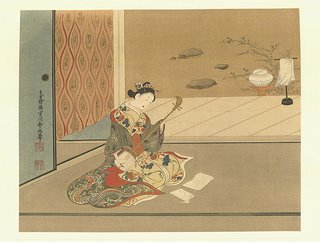|
 Secure Site
Secure Site
|
 |
Archive for the 'Goodness' Category
When you apply a few simple techniques, you can turn your daily walk into a rewarding practice.
 Hasui-b, Meguro Fudo What is mindful walking? It’s a technique that uses awareness of the mind/body connection to improve the quality of your walking experience on all levels. By approaching a walk in a mindful way, you make it a practice like yoga, meditation, or tai chi; every session brings new insights and challenges. As in yoga, you think about your body position, breathing, movements, and awareness, turning inward and outward at the same time. You’re working to get fit, and to improve your life as a whole. Treat walking as a practice, and it will become not only something you do with your legs but also a way to bring your mind, body, and spirit into balance.
Five Steps to Make Walking a Mindful Practice
- Identify your intention. The key to any mindful activity, intention provides focus and motivation, elevating your practice from routine to ritual. What is your intention? To walk for an hour every day? To develop a sense of centeredness and calm? To reduce stress? Your goals and intentions will evolve as you evolve. Let them, as long as they keep you in line with your higher sense of purpose — and keep you moving forward.
- Be consistent. A true practice requires ongoing attention. Of course, it’s natural to feel resistant at times, no matter what kind of activity you do. Your mind will create a thousand excuses not to walk today. Don’t let these passing thoughts distract you from your deeper intention. Get moving; start walking around your office or home, or wherever you are. You can quiet the mind by moving your body and get yourself back on track.
- Train your mind to focus. The mind loves — and craves — engagement. Without something to focus on, it will tend to wander, taking your practice with it. By learning to focus, you will be able to walk more efficiently.
- Listen to your body. As with any relationship, the connection between mind and body depends on how well one listens to the other. Our tendency is to try to rule the body with the brain; however, they are more like equal partners, offering feedback and direction as you go. Listen to what your body is trying to tell you by noticing any sensations that come up while you’re walking. You may feel energized as your leg muscles engage or relaxed as your breathing deepens. If you detect any complaint from your body, such as pain or discomfort, identify the source. Then make small adjustments in your technique and see whether the sensation lessens.
- Embrace the process. Goals provide a greater context for your practice. But building patient awareness of the process is even more important. Sometimes walking will feel easy and rewarding; other times, more like a chore. As part of a mindful practice, you accept the challenge as part of the process and continue to stick with it. My tai chi master sees difficulty as an opportunity — a lesson to be learned. Accepting all of these parts of the process lies at the heart of making walking a mindful exercise.
adapted from Body + Soul April/May 2006
 Digital Zen Alarm Clocks, meditation timers and alarm clocks with chimes
Now & Zen
1638 Pearl Street
Boulder, CO 80302
(800) 779-6383
Posted in Bamboo Chime Clocks, Goodness, Meditation Timers, Meditation Tools, mindfulness practice, Now & Zen Alarm Clocks, Well-being
 plum blossoms with moon The power of intention can be used to heal and promote good health, improve performance in many areas and even affect the future.
To be most effective, an intention should be a highly specific aim or goal, which you should visualize in your mind’s eye as having already occurred, while you are in a state of concentrated focus and hyper-awareness. When you imagine this future event, hold a mental picture of it as if it were occurring to you at that moment. Engage all five senses to visualize it in detail.
The centerpiece of this mental picture should be the moment you achieve the goal.
We might also improve the quality of our daily lives just by carrying out detailed mental rehearsals. At home, we might be able to send intentions to our children to perform better at school or to allow us to be more loving to friends and family. Human intention might be powerful enough to affect every element of our lives.
 Shunsui Katsu-Miyagawa All of these possibilities suggest that we have an awesome level of responsibility when generating our thoughts. Each of us is a potential Frankenstein, with extraordinary power to affect the living world around us. How many of us, after all, are sending out mostly positive thoughts?
 Bamboo Zen Clocks, progressive chime clock and timer
Adapted from Ode Magazine, Jan/Feb 2007 by Lynne McTaggart (The Intention Experiment: Using Your Thoughts to Change Your Life and the World, Free Press 2007)
Now & Zen
1638 Pearl Street
Boulder, CO 80302
Posted in Bamboo Chime Clocks, Chime Alarm Clocks, Goodness, intention, Japanese Inspired Zen Clocks, Meditation Timers, Meditation Tools, mindfulness practice, Natural Awakening, Now & Zen Alarm Clocks
 yugen, a profound mysterious sense of the beauty of the universe Yūgen is an important concept in traditional Japanese aesthetics. The exact translation of the word depends on the context. In the Chinese philosophical texts the term was taken from, yūgen meant “dim”, “deep” or “mysterious”. In the criticism of Japanese waka poetry, it was used to describe the subtle profundity of things that are only vaguely suggested by the poems, and was also the name of a style of poetry (one of the ten orthodox styles delineated by Fujiwara no Teika in his treatises).
Yugen suggests that beyond what can be said but is not an allusion to another world. It is about this world, this experience. All of these are portals to yugen:
“To watch the sun sink behind a flower clad hill. To wander on in a huge forest without thought of return. To stand upon the shore and gaze after a boat that disappears behind distant islands. To contemplate the flight of wild geese seen and lost among the clouds. And, subtle shadows of bamboo on bamboo.”
Zeami Motokiyo
Yugen is said to mean “a profound, mysterious sense of the beauty of the universe… and the sad beauty of human suffering”.
adapted from wikipedia.org
 Japanese Maple Leaves Dial Face, the Zen Alarm Clock for a progressive awakening Now & Zen
1638 Pearl Street
Boulder, CO 80302
Posted in Bamboo Chime Clocks, Chime Alarm Clocks, Goodness, Meditation Timers, Meditation Tools, mindfulness practice, Natural Awakening, Now & Zen Alarm Clocks, Progressive Awakening, wabi-sabi, Zen Timers
« Previous Page
Next Entries »
|
|
|
|